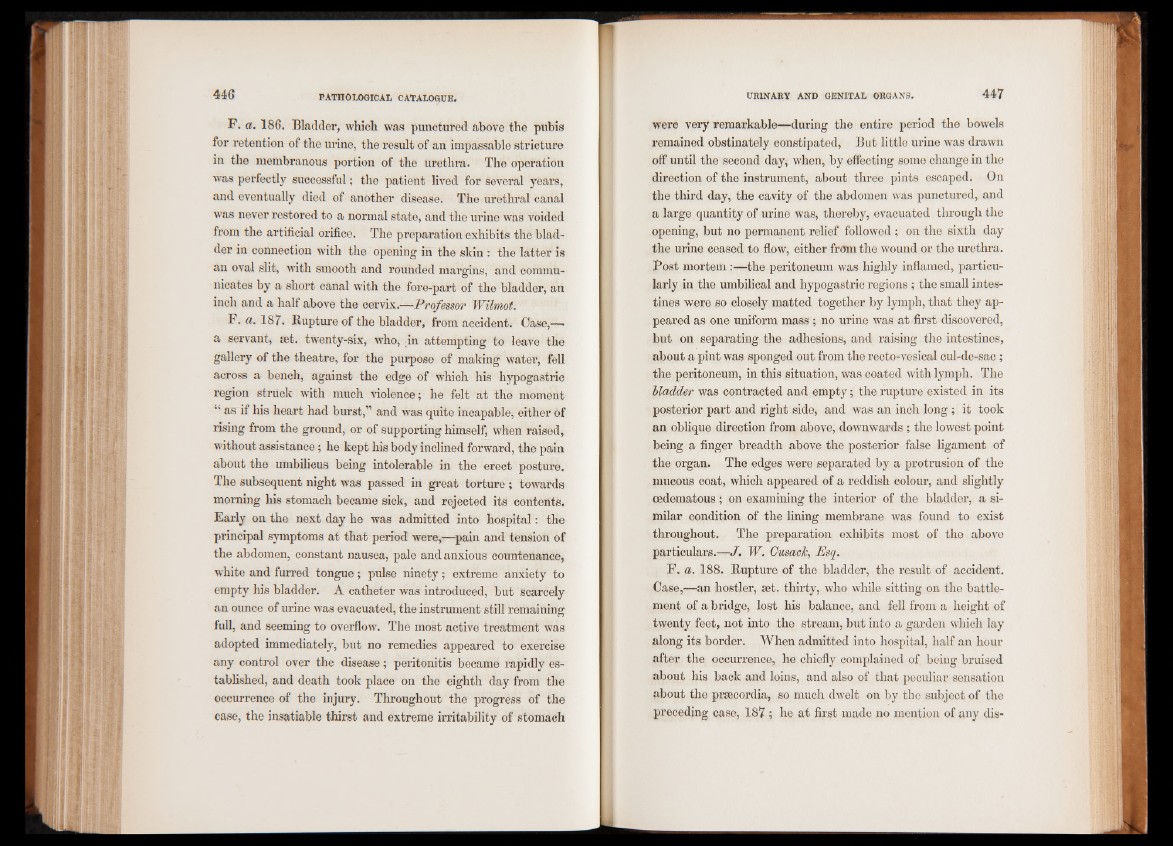
F. a. 186. Bladder, which was punctured above the pubis
for retention of the urine, the result of an impassable stricture
in the membranous portion of the urethra. The operation
was perfectly successful; the patient lived for several years,
and eventually died of another disease. The urethral canal
was never restored to a normal state, and the urine was voided
from the artificial orifice. The preparation exhibits the bladder
in connection with the opening in the skin : the latter is
an oval slit, with smooth and rounded margins, and communicates
by a short canal with the fore-part of the bladder, an
inch and a half above the cervix.—Professor Wilmot.
F. a. 187. Rupture of the bladder, from accident. Case,—•
a servant, set. twenty-six, who, in attempting to leave the
gallery of the theatre, for the purpose of making water, fell
across a bench, against the edge of which his hypogastric
region struck with much violence; he felt at the moment
“ as if his heart had burst,” and was quite incapable, either of
rising from the ground, or of supporting himself, when raised,
without assistance; he kept his body inclined forward, the pain
about the umbilicus being intolerable in the erect posture.
The subsequent night was passed in great torture; towards
morning his stomach became sick, and rejected its contents.
Early on the next day he was admitted into hospital: the
principal symptoms at that period were,—pain and tension of
the abdomen, constant nausea, pale and anxious countenance,
white and furred tongue; pulse ninety; extreme anxiety to
empty his bladder. A catheter was introduced, but scarcely
an ounce of urine was evacuated, the instrument still remaining
full, and seeming to overflow. The most active treatment was
adopted immediately, but no remedies appeared to exercise
any control over the disease; peritonitis became rapidly established,
and death took place on the eighth day from the
occurrence of the injury. Throughout the progress of the
case, the insatiable thirst and extreme irritability of stomach
were very remarkable—during the entire period the bowels
remained obstinately constipated, But little urine was drawn
off until the second day, when, by effecting some change in the
direction of the instrument, about three pints escaped. On
the third day, the cavity of the abdomen was punctured, and
a large quantity of urine was, thereby, evacuated through the
opening, but no permanent relief followed ; on the sixth day
the urine ceased to flow, either from the wound or the urethra.
Post mortem :—the peritoneum was highly inflamed, particularly
in the umbilical and hypogastric regions ; the small intestines
were so closely matted together by lymph, that they appeared
as one uniform mass ; no urine was at first discovered,
but on separating the adhesions, and raising the intestines,
about a pint was sponged out from the recto-vesical cul-de-sac ;
the peritoneum, in this situation, was coated with lymph. The
Madder was contracted and empty; the rupture existed in its
posterior part and right side, and was an inch long ; it took
an oblique direction from above, downwards ; the lowest point
being a finger breadth above the posterior false ligament of
the organ. The edges were separated by a protrusion of the
mucous coat, which appeared of a reddish colour, and slightly
cedematous; on examining the interior of the bladder, a similar
condition of the lining membrane was found to exist
throughout. The preparation exhibits most of the above
particulars.—J. W. Cusack, Esq.
F. a. 188. Rupture of the bladder, the result of accident.
Case,—an hostler, set. thirty, who while sitting on the battlement
of a bridge, lost his balance, and fell from a height of
twenty feet, not into the stream, but into a garden which lay
along its border. When admitted into hospital, half an hour
after the occurrence, he chiefly complained of being bruised
about his back and loins, and also of that peculiar sensation
about the prsecordia, so much dwelt on by the subject of the
preceding case, 187; he at first made no mention of any dis